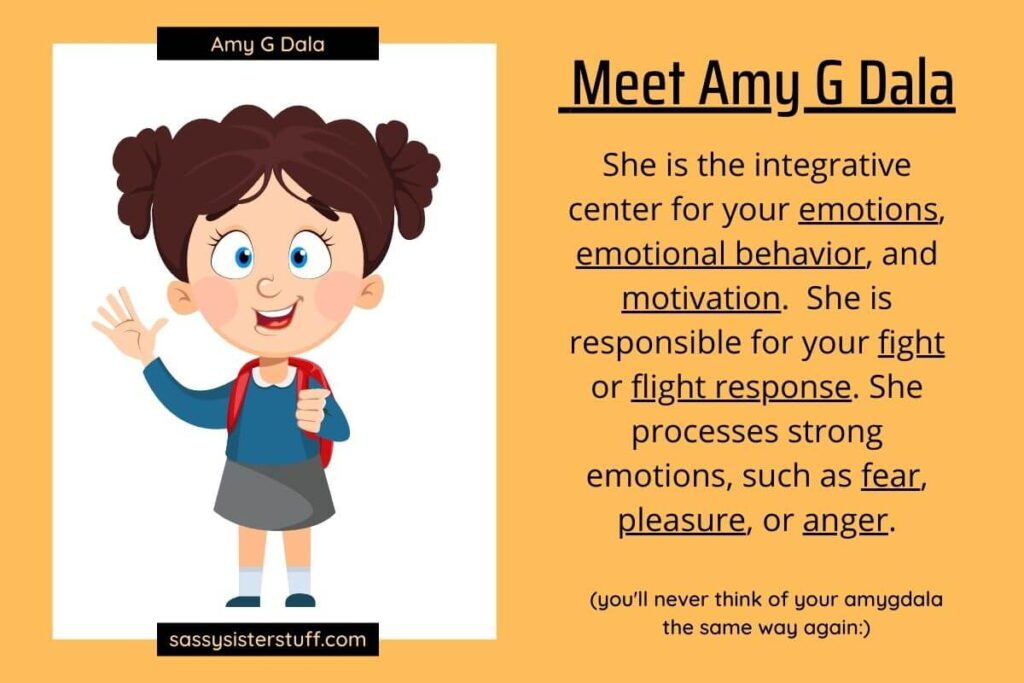23 Easy Ways to Help Rewire Your Anxious Brain
Anxiety appears in many different ways, but it comes directly from your anxious brain. Specifically, it comes from the amygdala or cortex parts of your brain. In this article, you will learn how to rewire your anxious brain to help you live a more peaceful, happy, and fulfilling life.
Anxiety begins with what you think about, and how you react to things. It’s a component of the neuroscience field of study and can be treated in a variety of ways. But we are going to explore 21 relatively simple things that you can do on your own to rewire your anxious brain.
Although I am not a mental health provider, I have LOTS of experience with anxiety — I am a survivor of Post Traumatic Stress Disorder (PTSD) so I have personally used ALL of these strategies for survival and recovery. I have also been trained and certified in multiple brain-based reading instruction programs, and I’ve been a part of studies about the relationship between the amygdala and student learning.

Disclaimer: Since I am not a professional in the field of mental health, I encourage you to consult with a professional mental health provider if you are struggling with anxiety.
Brain Function and Anxiety
Before we get started, I want to share a brief (and relatively easy) summary about the connection between brain function and your emotions from the website Healthline.com:
“The amygdala is responsible for processing strong emotions, such as fear, pleasure, or anger. It might also send signals to the cerebral cortex, which controls conscious thought. Signals sent from the thalamus to the autonomic nervous system and skeletal muscles control physical reactions.“
I thought this was the most concise information I’ve ever seen about how the brain controls your anxiety and emotions. It certainly helped me understand the role that emotional regulation plays in student learning. And it helped me better understand my own struggle with PTSD.
Students cannot learn when their amygdala is highly stimulated because they are in fight or flight mode. Just like people cannot deal well with LIFE when the amygdala is highly stimulated because anxiety becomes overwhelming. There is a deep connection between the amygdala and anxiety.
Do you know the big fancy word that allows you to “rewire your anxious brain?” Neuroplasticity. Yep… when you are trying to rewire your brain to overcome something — a learning disability, anxiety, a traumatic brain injury, a stroke, etc — it’s because the brain has an incredible ability to change and adapt as a result of what we do and say. It’s called neuroplasticity. I’ve always thought that was a fascinating word!
Anyway, you can begin to take back your life by implementing these 21 easy strategies to help rewire your anxious brain.

Ways to Rewire Your Anxious Brain
Let’s not spend too much time on big psychology and neuroscience words since I’m not an expert in those fields. I’m just a normal person with anxiety who wants to help others with anxiety.
But let me share simple definitions of these words to help you develop a more meaningful understanding of the big picture as you work through your anxiety:
- Neuroscience is the science of the structure and function of the neurological system, including the brain.
- Psychology is the scientific study of the human mind and its functions, especially those affecting behavior.
These are strategies I used in my own personal recovery from PTSD — I hope you find them useful for managing your anxiety.
1. Go for a Walk: Walking and fresh air helps clear your mind and offers you a different perspective on things.
2. Rest: Take a day off and spend a whole day doing exactly what you want to do. Self-care refreshes your brain.
3. Indulge: Do something different and exciting to help get your mind off your worry.
4. Educate Yourself: Research what you are experiencing that is causing your anxiety and arm yourself with the resources to tackle the problem.
5. Plan and Prepare: To avoid extra stress or unexpected conflict, be sure to plan and prepare as much as possible every day.
6. Identify Your Strengths: Create a list of at least 20 of your strengths and keep it handy to review it as needed. Take time to reflect on your strengths.
7. Keep Moving Forward: Even on the worst days, DO SOMETHING. Take baby steps. One step-at-a-time will serve you better than doing nothing.
8. Re-visit or Start a New Hobby: Hobbies help relieve stress and clear the brain from worry and anxiety.
9. Prioritize: Decide what’s important now and let the less important things go when you are dealing with heightened anxiety.
10. Get Proper Sleep: Getting enough sleep is essential to your emotional, mental, physical, and spiritual health. You need at least 7-8 hours of sleep each night. Sleep affirmations may help you develop good sleep habits.
11. Laugh and Be Silly: Do something that makes you laugh. Skip in the rain… watch reruns of Friends or Golden Girls… skip rocks across a lake… go to a comedy show.
12. Cry: Crying is an incredible source of relief and it’s very empowering. Release all your emotions and you will feel better.
13. Feel All Your Emotions: Don’t try to deny your feelings or pretend you are not anxious. Feel every single emotion — identify and spend time with each different emotion. An Emotion Wheel may be helpful.
14. Reflect: Journaling is a great way to reflect and process your anxious thoughts, but you can also find a quiet spot to sit and THINK. This will help you sort things out and free your mind. There are many topics of journal prompts to help you with whatever is bothering you.
15. Monitor Your Self-Talk: When you are feeling anxious, it’s very easy to fall into a mindset of negativity and self-blame. Negative self-talk does not serve you.
16. Remind Yourself That Life is a Journey: Remember yourself that life is a journey of ups and downs — this will pass. Tomorrow is a new day.
17. Monitor Nutrition: Eating healthy foods and drinking plenty of water will help “feed and water your brain” for better processing and more brain energy.
18. Protect Your Energy: It is very easy to find yourself giving too much of your energy to others, or to the problems in your life. Remember that you cannot solve all problems so don’t give all your personal energy to your anxiety.
19. Protect Your Peace of Mind: Make it a priority to protect your peace of mind and happiness. Focus on the positive things in your life that bring you joy and provide opportunities to satisfy your inner soul.
20. Find Your Zen: If you are like most people, your place of Zen is likely associated with mindfulness, slowing down, deep breathing, finding gratitude and grace, and being happy. Pause… breathe… relax… and take time to identify what you need in your life to reach a Zen mindset that gives you relief from anxiety.
21. Accept that You Cannot Control Everything: Once you firmly develop an understanding that some things are out of your control, anxious thoughts become weaker and take up less brain energy. Work on acceptance.
22. Talk to Someone: It always helps to have a trusted friend or counselor to talk to about what’s bothering you. Be sure to identify someone who will be understanding, patient, and kind.
23. Breathe Deeply and Visualize: Take time to do breathing exercises regularly each day and breathe in happy thoughts, breathe out anxious thoughts. While you are deep breathing, visualize the thoughts coming into and leaving your body.

Rewiring an Anxious Brain (As Done by Professionals)
The strategies to rewire your anxious brain that I listed above can be done by anyone, anywhere, anytime. as you can see they are fairly simple techniques and strategies that are often included in a well-developed personal growth and wellness plan.
But professionals who work with the brain can also provide additional supports and strategies. There are many amygdala retraining techniques that can be used by professionals who work with the brain.
There is Eye Movement Desensitization and Reprocessing (EMDR) that is done with a trained psycho-therapist.
There are even rewire your anxious brain exercises and you can do at home under the guidance of a professional.
But the more in-depth and scientific strategies require you to work with people who study the neuroscience of anxiety and have a deep understanding of anxiety and the brain.
Don’t let your fear of the end of the world or your fear of your house burning down cause undue anxiety — seek professional help as needed while you begin using my 21 easy ways to rewire your anxious brain.

Final Thoughts: Ways to Rewire Your Anxious Brain
Anxiety is a complex emotional response similar to fear. It can arise from two different pathways in your brain that produce psychological and behavioral responses in your brain. Let’s make anxiety less of a burden in your life so you can go out there and life your best life! You need to gain control of your anxiety so it does not limit you.
For more about how anxiety works, I highly recommend that you read or listen to the book, Rewire Your Anxious Brain: How to Use the Neuroscience of Fear to End Anxiety, Panic, and Worry by Catherine M Pittman and Elizabeth M Karle. How anxiety works in the brain is presented in simple, everyday language. It’s also recommended by many therapists who treat anxiety. It makes neuroscience and anxiety easier to understand!
I hope this information helps you rewire your anxious brain so you can become the person you are meant to become. If you know someone who suffers from anxiety, please share the article. Best Wishes on your journey!
Love to ALL! ~ Susan
What Strategies Are You Going to Use to Rewire Your Anxious Brain?
Share in the comments:)







